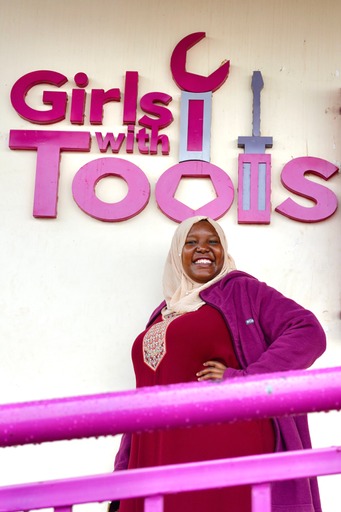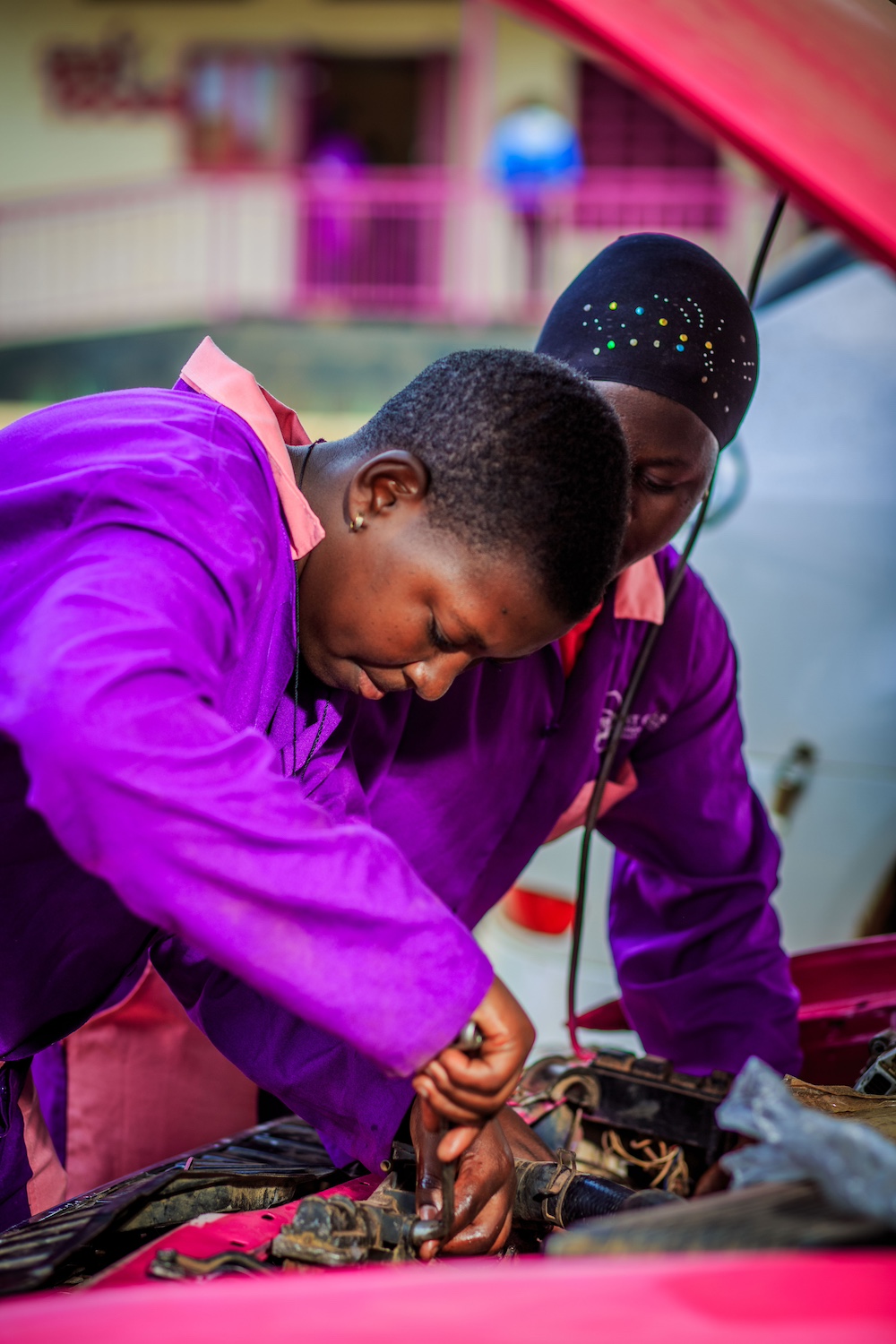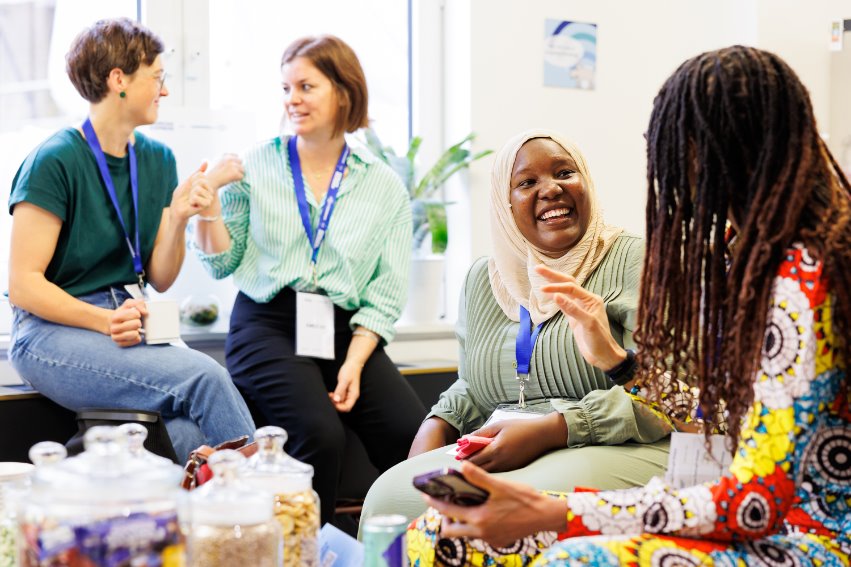
Smart Girls Uganda's Girls With Tools program teaches girls the necessary skills to build a career in male-dominated, non-traditional STEM industries. (Image courtesy of Smart Girls Uganda.)
Education and training have to be accessible to be effective. But for those in poor and rural communities, menstruation can be a barrier. Entrepreneur and innovator Jamila Mayanja recognized this and did something about it.
Mayanja founded the nonprofit Smart Girls Uganda, which offers education programs and ensures accessibility by distributing menstrual hygiene bags that solve one of the primary issues causing girls to drop out of school: period poverty.
Vocational and tech training brings success
“Smart Girls Uganda is a social enterprise I started to empower girls and women to live a healthy and economically sustainable lifestyle,” Mayanja told TriplePundit. “We do this through one of our biggest programs that is called the Girls With Tools, where we train girls in male-dominated, non-traditional, STEM [science, technology, engineering and math] skill sets. Skills like electrical engineering, mechanical engineering, motor engineering, building and construction welding.”

The organization also runs Girls in Tech, a four-month certification program that equips participants with computer skills. While the program ensures that graduates have the necessary tech literacy to succeed in their careers and is also available to community members, Mayanja said
So far, 729 students have graduated from Girls With Tools and another 210 are enrolled, Mayanja said. While most participants are girls or young women, boys and young men make up 20 percent of participants.
Girls in Tech, which began last year, has certified 529 graduates. The goal is to educate 500 students each year in computer literacy, 80 percent of which are also expected to be girls or young women.
“You'll be amazed if you come to Uganda,” Mayanja said of the young women who are now working in the country’s energy sector. Graduates of Girls With Tools are filling electrical engineering roles in the country’s newly developing oil industry, and they’ve signed a contract to employ more graduates in the industry every year.
Graduates are also working in garages and mechanical and water engineering, which she said made Smart Girls Uganda a household name. “Everybody now has started appreciating the need of hands-on skills, and mostly those vocational skills, for young women and how they're thriving in their job sector.”

A solution to period poverty
It’s a huge accomplishment for young women who would otherwise have very little opportunity for economic independence. “Some of them are usually school dropouts,” Mayanja said of Girls With Tools participants. “And we found out why … they're dropping out because of their menstruation periods.”
Not having access to proper menstruation products and facilities is a common cause of absenteeism and early school leaving worldwide. This issue is exacerbated in areas with limited resources and a lack of restroom facilities equipped for managing menstruation.
Mayanja, who was familiar with the problem before starting Smart Girls Uganda, used to hand out reusable pads. But that wasn’t enough to keep the girls in school, she said. The problem inspired her to develop a solar-powered smart bag made from recycled materials that would better meet their needs.
“It's a bag we make out of recycled [plastic] waste to make it waterproof, and then [we] add a solar panel to it that charges a light bulb in the bag,” Mayanja said. “That gives light to the girls after dark to be able to read their books, but also light [for] them when they're going to wash facilities at night to use to change their pads.”
The smart bags are made by tailoring students from Girls With Tools, thus providing them with employment, Mayanja said. The plastic used to make them is purchased from collectors, keeping plastic out of the environment and creating an income stream for the collectors.
In addition to giving the bags to students for free, they are sold at local markets and to local and international organizations. The proceeds fund more free bags for students in need. The bags are distributed with a pack of reusable pads.
Because of the bags, “More girls are being given the ability to stay in school during their menstruation period,” Mayanja said. “But also, we’ve indirectly given light in the home … because when the girls finished reading … the family uses the light.”
Scaling up will take time
Mayanja credits the American Express Leadership Academy, which she recently attended, with giving her the confidence she needs to scale up Smart Girls Uganda.
“It has really taught me [to] appreciate my resilience,” she said. “I was a bit depressed for my failure from scaling to South Africa. But being there and learning about how, [in the] leader's position I'm in, I need to be fine that sometimes I fail. But also to appreciate my hard work, and really understand that, to be able to do new strategies on getting up [from] that failure.”
Adirupa Sengupta — group chief executive at Common Purpose, which provides the programming for the academy — echoed the importance of confidence, resilience and leadership.
"We are committed to supporting leaders in the non-profit sector who are driving social impact," Sengupta said. "Visionary leaders like Jamila are at the forefront of addressing complex social challenges, and the academy provides them with the space to reflect, collaborate, and unlock new strategies for driving change."

Requests to scale the model have come in from other African countries like Nigeria, Tanzania and South Sudan, but Mayanja wants to take it slow. She’s interested in reaching all of Uganda before starting in other countries, and she wants to develop solid partnerships that will make scaling up less costly and more effective.
“The more I kept on learning … from the scale I started in South Africa, is that I needed more knowledge and more partnerships to scale, to scale properly without rushing, and so that my brand is not affected,” she said. “So yes, it can be replicated. … Don't be surprised if you see us in other countries, that same exact model, because we’re working on it.”

Riya Anne Polcastro is an author, photographer and adventurer based out of Baja California Sur, México. She enjoys writing just about anything, from gritty fiction to business and environmental issues. She is especially interested in how sustainability can be harnessed to encourage economic and environmental equity between the Global South and North. One day she hopes to travel the world with nothing but a backpack and her trusty laptop.














